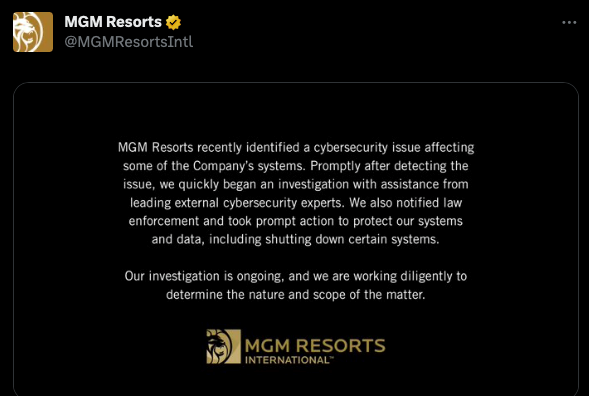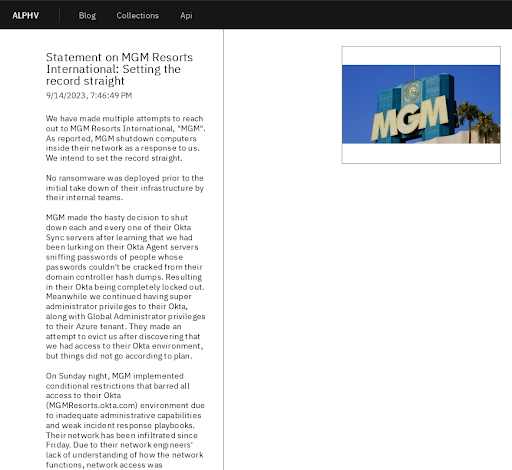Boyd, C. (2023). Ransomware group Steps up, issues statement over MGM Resorts compromise. Malwarebytes. https://www.malwarebytes.com/blog/personal/2023/09/ransomware-group-steps-up-issues-statement-over-mgm-resorts-compromise#:~:text=We%20have%20made%20multiple%20attempts,infrastructure%20by%20their%20internal%20teams
Jones, D. (2023, September 25). MGM Resorts warns customers of fraud as it faces class action lawsuits. Cybersecurity Dive. https://www.cybersecuritydive.com/news/mgm-resorts-negligence-lawsuits-cyber/694618
Kagan, S. (2023, September 21). Unmasking the ALPHV-MGM Saga: A masterclass in cybersecurity missteps and ethical conundrums. The Final Hop. https://www.thefinalhop.com/unmasking-the-alphv-mgm-saga-a-masterclass-in-cybersecurity-missteps-and-ethical-conundrums/
Kovacs, E. (2023, September 14). Ransomware gang takes credit for disruptive MGM Resorts cyberattack. SecurityWeek. https://www.securityweek.com/ransomware-gang-takes-credit-for-highly-disruptive-mgm-resorts-attack/
Milutinovic, R., Malenovic, M., & Mitic, V. (2023, September 18). MGM loses up to $8.4 million in daily revenues to recent cyberattack. World Casino News. https://news.worldcasinodirectory.com/mgm-loses-up-to-8-4-million-in-daily-revenues-to-recent-cyberattack-110386
Morrison, S. (2023, September 15). The chaotic and cinematic MGM Casino Hack, explained. Vox. https://www.vox.com/technology/2023/9/15/23875113/mgm-hack-casino-vishing-cybersecurity-ransomware
Figure 1: https://twitter.com/mgmresortsintl/status/1701256032369164399?s=46&t=lsQnDGaIxXu8473b2CsBoQ
Figure 2: https://cybernews.com/news/mgm-caesars-ransom-hacker-alphv-statement/

